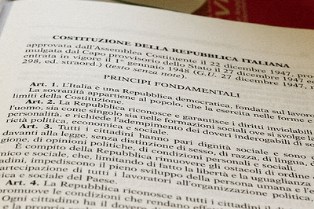
 Umberto Mucci
Umberto Mucci
Italian politics: Judicial Responsibility in Italy, is something finally changing?
- WTI Magazine #35 Jun 18, 2014
-

 Umberto Mucci
Umberto Mucci
WTI Magazine #35 2014 June, 18
Author : Francesca Papasergi Translation by:
The separation of powers stated by Montesquieu in "The Spirit of Laws" is a strengthened reality in many Western countries. As we all know, the governance of the state is organized in three different branches, legislative, executive and judiciary. According to Montesquieu himself, the latter must be the more independent and unchecked, because of its fundamental peculiarities. Like everywhere else, the judiciary power in Italy is settled by the Constitution and regulated by many laws.
Last week, Italy had a little short circuit among the three powers. The parliamentary opposition had enough votes to pass an amendment against the government's decision. It was about the judges responsibility, a controversy that Italy discussed for a very long time.
Until 1987, prosecutors and judges were responsible only in case of malice, fraud, bribery or denial of justice. After the referendum, held in the wake of the popular reaction to the Tortora Affair*, the law changed. Since 1988, magistrates are responsible in case of malice, negligence or denial of justice. Many people think that the spirit of the referendum was different. Among them there are some supporters of Mr. Berlusconi: his troubled intercourse with the Italian judges didn't turn him into a protector of civil right; on the contrary, his excesses made many Italians think he wanted to take advantage of his position and change the laws at his convenience.
The Judiciary Power Reform is on Mr. Renzi's list, but wasn't expected so soon. A Northern League's representative, Mr. Gianluca Pini, proposed an amendment to change the existing law, and even some representatives from the Democratic party approved it. Apparently, it was meant to adapt the Italian norm to the EU prescriptions, but it brought up a specious issue. On the other hand, the judges' union is projecting actions "to defend Italian Justice". Whatever this reform will bring, people won't be able to sue judges. If the conditions will allow them, they will sue the State, like they do today. Then, the State will be able to recover the compensations, cutting the judges salary until they pay back everything.
Right or wrong, it is how the European Union works in this field, and Italy has to change. This doesn't mean the reform should be made up by the opposition: Mr. Renzi knows he can't leave this particular issue in Mr. Berlusconi's hands. We're now on square one: let's see how good the government is at the reforms' game.
*Enzo Tortora, a famous tv host, was acquitted after years on trial because of unjustified and insubstantial accusations.